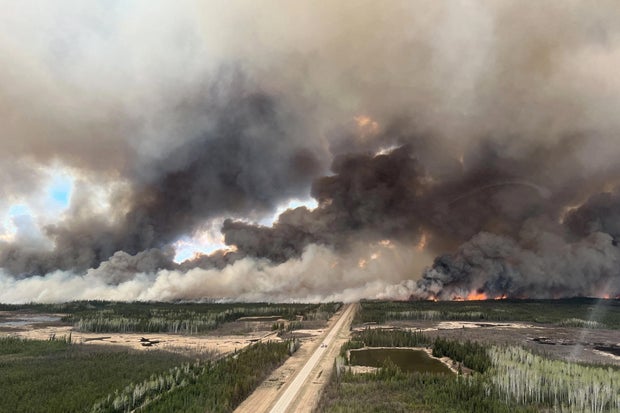Thousands of people are being evacuated in Canada due to a wildfire, which has also led to hazardous air quality caused by smoke.
A fast-growing wildfire in northeastern British Columbia has prompted authorities to urge thousands of residents from a Canadian town to evacuate due to poor air quality and reduced visibility.
The blaze, which began on Friday, nearly doubled in size by the following day, reaching approximately 4,200 acres. BC Wildfire Service maps indicated the fire burning just a few miles west of the city limits of Fort Nelson. Situated in the far northeastern corner of British Columbia, Fort Nelson, along with the Fort Nelson Indian Reserve, has a combined population of about 3,000 people.
Smoke from the wildfire has resulted in widespread poor air quality and reduced visibility across the region, as stated in a Sunday alert.
Online videos and images shared by locals depict thick smoke rising into the sky, obscuring houses and creating a haze over wide areas.
The Northern Rockies Regional Municipality and Fort Nelson First Nation issued a joint statement advising residents who choose to remain that emergency medical services and essential amenities are not available.
Mayor Rob Fraser emphasized that most residents in and around Fort Nelson have been evacuated, with police conducting door-to-door checks to ensure everyone's safety.
"In times of uncertainty, unity is crucial," stated Fraser in the press release. "Please evacuate calmly; our collective strength will be our resilience."
Health authorities confirmed the safe evacuation and closure of Fort Nelson General Hospital until further notice.
Meanwhile, in Alberta, authorities issued an alert regarding a wildfire approximately 15.5 miles southwest of the oil sands city of Fort McMurray, which may impact highway visibility in certain areas. No evacuation orders have been issued for the major Canadian oil city.
Fire restrictions will remain in effect until conditions improve, with firefighting efforts challenged by windy conditions.
High winds spread smoke across Alberta on Saturday, prompting an air quality advisory for the city of Edmonton, with hazard levels rated as "very high risk."
Meteorologists predict ongoing poor air quality until at least Monday or Tuesday, advising residents to stay indoors.
Canadian officials warned that individuals with lung diseases, heart disease, older adults, children, pregnant women, and outdoor workers are at higher risk of health effects from wildfire smoke. They recommended wearing masks outdoors to reduce exposure to fire particles in the smoke.
Last year's historic fires prompted Canadian officials to warn of the potential for another catastrophic wildfire season. Warmer-than-normal temperatures and widespread drought conditions across Canada this winter have set the stage for wildfires, with weather forecasts predicting higher-than-normal temperatures this spring and summer.
Canada typically experiences wildfire season from May to October, and the country is home to approximately 9% of the world's forests.
In 2023, Canada witnessed record wildfires that caused choking smoke in parts of the U.S., leading to evacuations across British Columbia and severe air quality issues in New York City and other areas.
The severe weather in 2023 resulted in over $3.1 billion in insured damages, according to officials.

Post a Comment